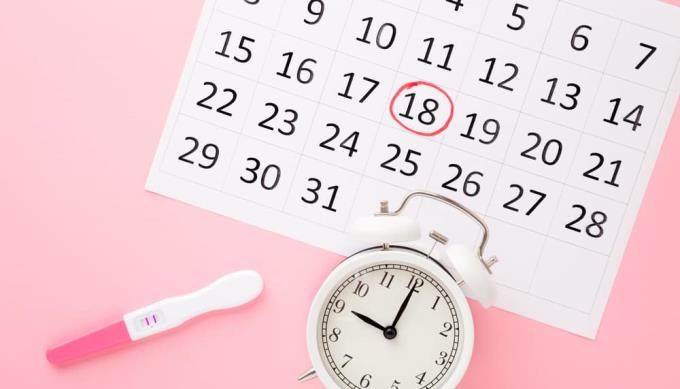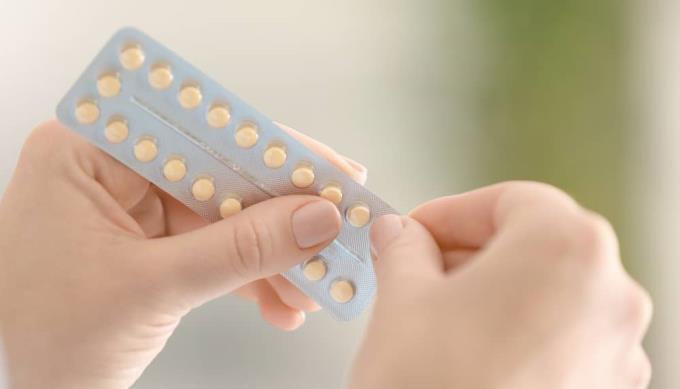When to get a pregnancy test to get the correct result is one of the most common issues for women who are looking forward to the good news. To get answers to this question, please find out the following information immediately.
While it's easy to do, research shows that confirming pregnancy with a pregnancy test can still give false results if you use it incorrectly. One of the most common mistakes in using a pregnancy test is that using the wrong timing makes it unable to detect the pregnancy hormone Human Chorionic Gonadotropin (hCG) in the urine. To avoid making this mistake, you should keep in mind the following:
Find a solution for when to use a pregnancy test to get accurate results

To know when to have a pregnancy test is appropriate, you need to have a brief understanding of the pregnancy test as well as how this tool works. A pregnancy test is a tool to help you determine if you are pregnant or not based on a response to hCG levels in your urine. Once the implantation of the egg and the placenta begins to develop, hCG can be released into your bloodstream and gradually increase over the next few weeks of pregnancy. Some of the hCG will also be eliminated in the urine. Therefore, using a pregnancy test can help you detect the pregnancy hormone hCG. The pregnancy test is said to be about 97% accurate if used correctly, so you can be sure to use it for home pregnancy tests .
To answer the question of when to use the pregnancy test to get the correct results, you should use it after about a week of late menstrual cycle. Even if you're impatient to get pregnant and don't want to wait until your period to see results, at least be patient until a week or two after having sex to have a pregnancy test.
This is because once conception is successful , it takes a while for your body to secrete hCG levels up to the level that the pregnancy test can detect. At least 50 units of hCG are required in the urine for the pregnancy test to show a pregnancy result, says the expert. For some people, this hCG can be increased by up to 50 units even before you find yourself having missed periods, otherwise it will take longer for the body to release this amount.
Therefore, if the pregnancy test is too early, you may get false results. If the pregnancy test shows that you are not pregnant, but you are still not having a period, try again in 3 days. Another important note is that you should take a pregnancy test in the morning because this is the time when the hCG level in the urine is highest.
Reveal signs of when to take a pregnancy test
If you notice any of the following, it may be time to use a pregnancy test to see if you are pregnant:
1. Late menstrual cycle

Late period is one of the earliest signs of pregnancy that you can easily recognize. If you don't have the habit of keeping track of your monthly period, it can be harder to determine if you're actually having missed periods. So when should I have a pregnancy test in this situation? Answer that you may consider using a pregnancy test one month after your last period.
In addition, you should also pay attention to the amount of blood during your period if you suspect that you are pregnant. You are likely to experience hematology as the embryo moves and attaches to the uterine wall. Many people still mistakenly think this is a normal menstrual cycle.
However, there are still many reasons for you to suddenly lose your period even if you are not pregnant, such as psychological stress, stress, diet, exercise, medication ... So you should review your overall health. shouting before thinking that the missed period is due to pregnancy.
2. Cramps

Conception can cause the body to respond similarly to the cramping sensation during menstruation. At this stage, you may feel uncomfortable and think that your period is coming, but then you will notice that your period is coming later than usual. Therefore, although easy to recognize, these signs are often easily overlooked in the early stages of pregnancy.
3. When should I get a pregnancy test? That's when you feel chest tightness

During pregnancy, more hormones estrogen and progesterone are produced and changes are made in the body to support fetal development. One of the first changes you may notice is that the chest area may become more sensitive, tight, and enlarged due to increased blood flow in this area. The nipples may also be darker and the veins under the skin will become more prominent.
However, many people still experience this as they get closer to their period, so it may not always be a sign that you are pregnant.
4. Changes in health

If you are wondering when to have a pregnancy test, in addition to the warning signs such as late period, chest tightness, cramps, you should also pay attention to some health changes such as:
Nausea
Anorexia
Feeling tired, exhausted
Urinate often
During the first 3 months of pregnancy, these symptoms may become more apparent and help you realize that you are pregnant even before hCG levels rise to detectable by a pregnancy test. So, always be on the lookout for unusual health symptoms.
5. Unsuccessful use of contraception

Birth control pills, condoms or other birth control methods do not 100% protect you from becoming pregnant. In other words, there's always a very small chance that you will get an unwanted pregnancy even if you use contraception very carefully.
Some contraceptive mistakes can cause you to get pregnant earlier than planned, such as forgetting to take birth control pills . According to Planned Parenthood , 9 out of 100 women who take birth control pills will get pregnant if they don't take it as directed. Even the most common birth control method, which is using condoms, can go wrong. According to Planned Parenthood, nearly 18 out of every 100 women using condoms to prevent pregnancy are still pregnant each year.
So, even if you always implement birth control methods, you should still think about getting a pregnancy test if the signs that aFamilyToday Health mentioned above appear.
Although there are many different types of pregnancy test strips on the market today, you can still use them easily if you read carefully the instructions on how to use the pregnancy test . However, please pay attention to follow the correct steps used to not falsify the results! Hopefully, with the above sharing, you have clearly understood when to use the pregnancy test to get the most accurate results.

















